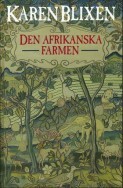Take a photo of a barcode or cover
I first ran across Karen Blixen's name in the Janet Flanner/ Solita Solano files in the Library of Congress unpublished manuscripts division. She was a compatriot of theirs in the twenties in Paris. This is the only book of hers that I have read. I enjoyed her descriptions of the wildlife and natural surroundings of Kenya, but I always felt that something was missing from this book. Maybe it was her husband. Maybe it was a feeling I had that she did not tell the whole story about why she had to leave the plantation. Perhaps something got lost because she spoke English as a second or third language. I have not seen the movie, so that does not play into my suspicions. Blixen is a fine storyteller, and her writing was deeply admired by Ernest Hemingway. Even with the feeling of incompleteness with which this book left me, I still highly recommend it.
adventurous
challenging
dark
emotional
hopeful
informative
inspiring
reflective
sad
slow-paced
This was an interesting memoir to read. It was kind of slow at parts but other times I found myself really enjoying it. The experiences she had living in Kenya were interesting to read about it but her overly-detailed descriptions of everything felt a little exhaustive at times.
adventurous
challenging
informative
sad
slow-paced
It’s only just barely getting a 3 and only because it’s a classic. But I hated it.
First, white woman privilege. I can’t hold it against Karen as it is obviously all she knew and to hold it against her would be to take this whole story out of context. But still.
Next, her casual description of animal cruelty made me want to throw this book across the room many times. If you care about lions, giraffes, flamingos or ox, you just do not want to read this. I’m pissy mad about all of that chatter.
Here is the one thing I save from the book because it makes me peaceful:
“And, like a cat, he made every room that he sat in, a place of comfort, as if he had in him a source of heat and fun....He had no principles, but a surprising stock of prejudices, as you would expect in a cat.”
I think that so much of this book I could not comprehend because I was torn between reading the words for face value (which was abhorring at times) and trying to understand if Blixen was trying to bring awareness to what she may have viewed as the wrongs of the privileged white peoples in Africa in the early 1900s. I do not know nor do I have the energy to figure it out.
This book challenged me.
First, white woman privilege. I can’t hold it against Karen as it is obviously all she knew and to hold it against her would be to take this whole story out of context. But still.
Next, her casual description of animal cruelty made me want to throw this book across the room many times. If you care about lions, giraffes, flamingos or ox, you just do not want to read this. I’m pissy mad about all of that chatter.
Here is the one thing I save from the book because it makes me peaceful:
“And, like a cat, he made every room that he sat in, a place of comfort, as if he had in him a source of heat and fun....He had no principles, but a surprising stock of prejudices, as you would expect in a cat.”
I think that so much of this book I could not comprehend because I was torn between reading the words for face value (which was abhorring at times) and trying to understand if Blixen was trying to bring awareness to what she may have viewed as the wrongs of the privileged white peoples in Africa in the early 1900s. I do not know nor do I have the energy to figure it out.
This book challenged me.
emotional
informative
slow-paced
Ik vond dit boek nogal droog geschreven, het verhaal krijgt me nergens in mijn greep. Verder vond ik de vele keren waarin op dieren werd gejaagd of dieren werden gedood niet leuk. Ik heb de verfilming niet gezien, maar ik denk dat dit een van de weinige keren is waarbij de film leuker is dan het boek.
I absolutely hated this book! Books written about colonialism are hard to swallow in our modern era. The author consistently refers to the native population as wild animals, savages, and magical beings. All of the old stereotypes are there. I would have been able to power through that though and just considered it a representative of the views of the time, had it been an interesting narrative or story, or well-written, but the book was also boring and dry to tears. I honestly have no idea why this book is famous or considered a much-read narrative. Nothing happens except this rich white European woman thinks herself a coffee plantation farmer without realizing everyone doing the work is the Native squatters. I think [b:Heart of Darkness|4900|Heart of Darkness|Joseph Conrad|https://d.gr-assets.com/books/1392799983s/4900.jpg|2877220] is better and Chinua Achebe is even better, but would love to read something by a Kenyan author, instead of this crap. I would not have finished this book if I hadn't been reading it for a challenge, and even then I had to skim through the very boring writing.
when I started this book my mother commented, "you do know that it's not all sexy Robert Redford-y like the movie right?" And it isn't. there is very little context or personal information. Instead, the book presents vignettes of a colonial Africa that were sometimes jarring but always honest and lyrical. I think it is important to memorialize (but not glorify) these viewpoints, those of "squatter Natives", and move on from them.

